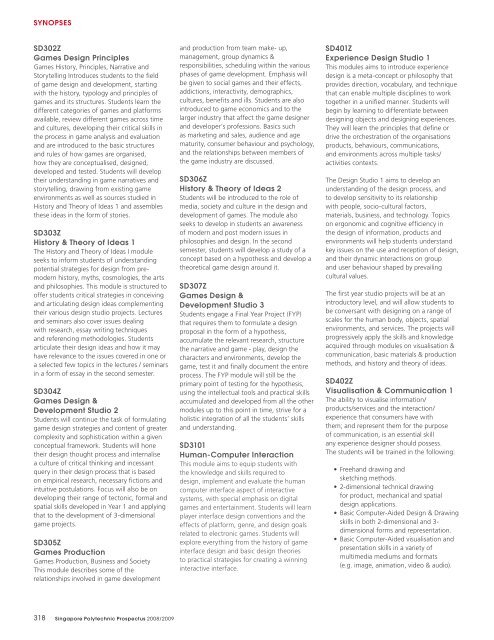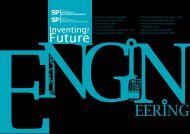SYNOPSES - Singapore Polytechnic
SYNOPSES - Singapore Polytechnic
SYNOPSES - Singapore Polytechnic
You also want an ePaper? Increase the reach of your titles
YUMPU automatically turns print PDFs into web optimized ePapers that Google loves.
<strong>SYNOPSES</strong>SD302ZGames Design PrinciplesGames History, Principles, Narrative andStorytelling Introduces students to the fieldof game design and development, startingwith the history, typology and principles ofgames and its structures. Students learn thedifferent categories of games and platformsavailable, review different games across timeand cultures, developing their critical skills inthe process in game analysis and evaluationand are introduced to the basic structuresand rules of how games are organised,how they are conceptualised, designed,developed and tested. Students will developtheir understanding in game narratives andstorytelling, drawing from existing gameenvironments as well as sources studied inHistory and Theory of Ideas 1 and assemblesthese ideas in the form of stories.SD303ZHistory & Theory of Ideas 1The History and Theory of Ideas I moduleseeks to inform students of understandingpotential strategies for design from premodernhistory, myths, cosmologies, the artsand philosophies. This module is structured tooffer students critical strategies in conceivingand articulating design ideas complementingtheir various design studio projects. Lecturesand seminars also cover issues dealingwith research, essay writing techniquesand referencing methodologies. Studentsarticulate their design ideas and how it mayhave relevance to the issues covered in one ora selected few topics in the lectures / seminarsin a form of essay in the second semester.SD304ZGames Design &Development Studio 2Students will continue the task of formulatinggame design strategies and content of greatercomplexity and sophistication within a givenconceptual framework. Students will honetheir design thought process and internalisea culture of critical thinking and incessantquery in their design process that is basedon empirical research, necessary fictions andintuitive postulations. Focus will also be ondeveloping their range of tectonic, formal andspatial skills developed in Year 1 and applyingthat to the development of 3-dimensionalgame projects.SD305ZGames ProductionGames Production, Business and SocietyThis module describes some of therelationships involved in game developmentand production from team make- up,management, group dynamics &responsibilities, scheduling within the variousphases of game development. Emphasis willbe given to social games and their effects,addictions, interactivity, demographics,cultures, benefits and ills. Students are alsointroduced to game economics and to thelarger industry that affect the game designerand developer’s professions. Basics suchas marketing and sales, audience and agematurity, consumer behaviour and psychology,and the relationships between members ofthe game industry are discussed.SD306ZHistory & Theory of Ideas 2Students will be introduced to the role ofmedia, society and culture in the design anddevelopment of games. The module alsoseeks to develop in students an awarenessof modern and post modern issues inphilosophies and design. In the secondsemester, students will develop a study of aconcept based on a hypothesis and develop atheoretical game design around it.SD307ZGames Design &Development Studio 3Students engage a Final Year Project (FYP)that requires them to formulate a designproposal in the form of a hypothesis,accumulate the relevant research, structurethe narrative and game - play, design thecharacters and environments, develop thegame, test it and finally document the entireprocess. The FYP module will still be theprimary point of testing for the hypothesis,using the intellectual tools and practical skillsaccumulated and developed from all the othermodules up to this point in time, strive for aholistic integration of all the students’ skillsand understanding.SD3101Human-Computer InteractionThis module aims to equip students withthe knowledge and skills required todesign, implement and evaluate the humancomputer interface aspect of interactivesystems, with special emphasis on digitalgames and entertainment. Students will learnplayer interface design conventions and theeffects of platform, genre, and design goalsrelated to electronic games. Students willexplore everything from the history of gameinterface design and basic design theoriesto practical strategies for creating a winninginteractive interface.SD401ZExperience Design Studio 1This modules aims to introduce experiencedesign is a meta-concept or philosophy thatprovides direction, vocabulary, and techniquethat can enable multiple disciplines to worktogether in a unified manner. Students willbegin by learning to differentiate betweendesigning objects and designing experiences.They will learn the principles that define ordrive the orchestration of the organisationsproducts, behaviours, communications,and environments across multiple tasks/activities contexts.The Design Studio 1 aims to develop anunderstanding of the design process, andto develop sensitivity to its relationshipwith people, socio-cultural factors,materials, business, and technology. Topicson ergonomic and cognitive efficiency inthe design of information, products andenvironments will help students understandkey issues on the use and reception of design,and their dynamic interactions on groupand user behaviour shaped by prevailingcultural values.The first year studio projects will be at anintroductory level, and will allow students tobe conversant with designing on a range ofscales for the human body, objects, spatialenvironments, and services. The projects willprogressively apply the skills and knowledgeacquired through modules on visualisation &communication, basic materials & productionmethods, and history and theory of ideas.SD402ZVisualisation & Communication 1The ability to visualise information/products/services and the interaction/experience that consumers have withthem; and represent them for the purposeof communication, is an essential skillany experience designer should possess.The students will be trained in the following:• Freehand drawing andsketching methods.• 2-dimensional technical drawingfor product, mechanical and spatialdesign applications.• Basic Computer-Aided Design & Drawingskills in both 2-dimensional and 3-dimensional forms and representation.• Basic Computer-Aided visualisation andpresentation skills in a variety ofmultimedia mediums and formats(e.g. image, animation, video & audio).318 <strong>Singapore</strong> <strong>Polytechnic</strong> Prospectus 2008/2009
















